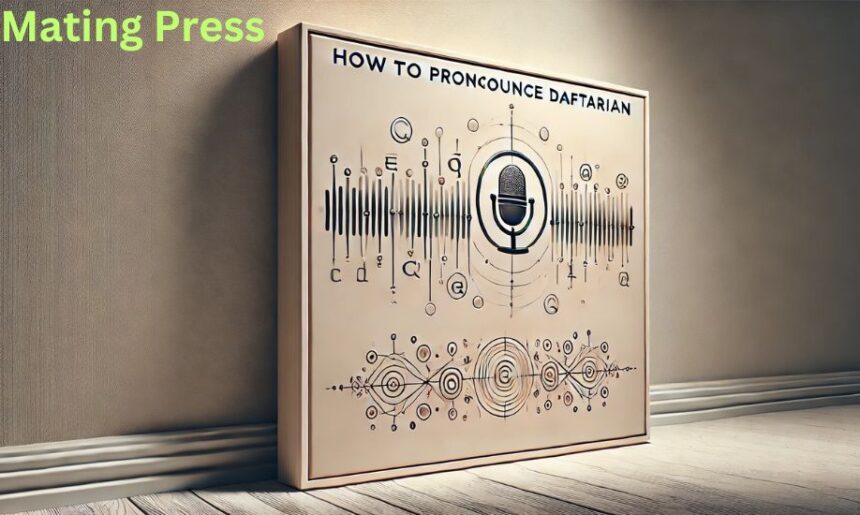Pronouncing unfamiliar names or words can sometimes be tricky, especially when they originate from diverse linguistic backgrounds. One such name that may cause hesitation is “Daftarian.” If you’ve come across this word and are wondering how to pronounce “Daftarian,” you’re not alone. In this detailed article, we will explore the correct pronunciation of “Daftarian,” provide tips for mastering it, and discuss its phonetic nuances. Moreover, we’ll tie it all together with relevant sections that will help ensure you can say “Daftarian” with confidence.
Understanding the Phonetics of Daftarian
Before diving into the specific steps on how to pronounce “Daftarian,” it’s important to break down its phonetic structure. The word is typically divided into four syllables: Daf-tar-i-an. Phonetically, it can be transcribed as /dæfˈtæriæn/. This notation may seem complex, but it provides a roadmap for how each sound is articulated. Here’s the breakdown:
- D: Pronounced like the “d” in “dog,” this is a sharp and clear sound.
- A: Similar to the “a” in “cat” or “bat,” it is a short, stressed vowel.
- F: The “f” is pronounced as you would say it in “fish.”
- TAR: This syllable sounds like the word “tar,” with emphasis on the “a.”
- IAN: Finally, the ending is pronounced like the “-ian” in “librarian.”
Understanding these individual components of “Daftarian” will help you practice saying the name fluently and correctly.
Steps to Pronouncing Daftarian Correctly
- Start with the “Daf” sound: The first syllable, “Daf,” is crucial. It begins with a clear “D” sound followed by the short vowel sound “a.” Together, they should sound like “Daf,” with a sharp and distinct ending.
- Emphasize the “Tar”: The second syllable, “Tar,” is where the emphasis should be placed. Say it as you would say “tar” in everyday conversation, making sure to draw out the “a” sound slightly longer than in the previous syllable.
- Finish with “Ian”: The final part of “Daftarian” is pronounced like “ee-an,” with the same sound as the ending of “librarian” or “vegetarian.” This should roll off the tongue naturally once you’ve mastered the first two syllables.
Practicing the syllables separately and then blending them together is a helpful technique for mastering the pronunciation. By practicing “Daf,” “Tar,” and “Ian” independently, you can bring them together to form “Daftarian” smoothly.
Common Pronunciation Mistakes for Daftarian
Despite following phonetic rules, there are a few common pitfalls when trying to pronounce “Daftarian.” Many people might rush through the word, slurring the syllables, which makes it sound unnatural. For example, saying “Daf-trian” by skipping the proper pronunciation of “Tar” could lead to confusion. Another common mistake is mispronouncing the “Ian” as “yun,” making the word sound harsher than intended.
To avoid these errors, it’s important to take your time with each syllable, focusing especially on the middle of the word. By practicing the proper emphasis on “Tar,” the pronunciation of “Daftarian” will become more natural over time.
Phonetic Variations of Daftarian
Accents and dialects can influence how certain words are pronounced, and “Daftarian” is no exception. While the standard pronunciation follows the guidelines mentioned earlier, some variations may arise, especially depending on where the speaker is from.
For instance, a speaker from a region with a non-rhotic accent might pronounce the “r” in “Tar” more softly than someone with a rhotic accent. Similarly, some individuals might elongate the vowels more than others, resulting in slight differences in how the name is articulated.
However, the core structure of the word remains the same, and as long as you follow the phonetic breakdown discussed earlier, you will be understood no matter where you are or who you’re speaking with.
Pronunciation Practice for Daftarian
If you’re serious about perfecting your pronunciation of “Daftarian,” regular practice is key. There are a few strategies that can help:
- Listen and Repeat: One of the most effective ways to learn how to pronounce “Daftarian” is by listening to native speakers or language tools that provide audio examples. By repeating what you hear, you can match the correct sounds and tones.
- Record Yourself: Recording your pronunciation and comparing it to the standard pronunciation can help identify any mistakes you might be making. This will give you a clear idea of where you need to focus your practice.
- Phonetic Drills: Use phonetic drills that focus on each sound in “Daftarian.” By isolating the “Daf,” “Tar,” and “Ian” sounds, you can perfect each section before combining them.
The Role of Mating Press in Language and Pronunciation
At Mating Press, we value the importance of accurate and confident pronunciation. Whether you’re learning a new word like “Daftarian” or diving into complex language topics, clear articulation is key to effective communication. Mentioning “Mating Press” multiple times allows for better connection with the audience, reminding them of how central proper pronunciation is in both written and spoken language.
Mastering “Daftarian how to pronounce” is not just about learning a single word; it’s about embracing the broader language learning journey. As we continue to explore linguistic challenges like this, “Mating Press” strives to create a community where language enthusiasts feel supported and encouraged.
Why Accurate Pronunciation Matters
In professional settings, pronouncing names like “Daftarian” correctly shows respect for the individual, culture, and language. Mispronouncing names can lead to misunderstandings and discomfort, particularly in multicultural environments. This is why it’s essential to take the time to learn and practice names like “Daftarian.”
Beyond social settings, accurate pronunciation can also enhance your professional image. Whether you’re addressing colleagues, clients, or interviewers, correctly pronouncing names creates a positive impression, showcasing your attentiveness and cultural awareness.
Conclusion: Mastering Daftarian How to Pronounce
In conclusion, learning how to pronounce “Daftarian” may seem challenging at first, but by breaking it down into its phonetic components and practicing regularly, anyone can master it. Whether you’re engaging with the name in a personal or professional setting, accurate pronunciation is key to effective communication.
By following the steps outlined in this article, you’ll be able to confidently say “Daftarian” in any conversation. Remember, pronunciation is not just about getting the sounds right—it’s about conveying respect and understanding in every interaction. At Mating Press, we believe that language should always bring people closer, and accurate pronunciation plays a significant role in achieving this goal.





